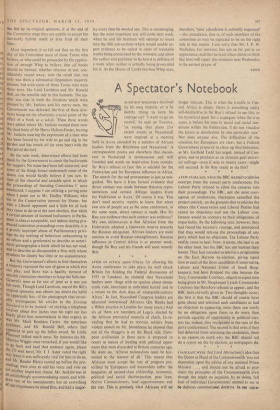A FEW YEARS AGO, when the BBC wanted to televise
excerpts from the annual party conferences, the Labour Party refused to allow the cameras into their proceedings. The BBC, not the most cour- ageous of institutions, thereupon cancelled the project entirely, on the grounds that to televise the others (the Conservative and Liberal Parties had raised no objection) and not the Labour con- ference would be contrary to their obligations of impartiality. By the following year, however, they had found the necessary courage, and announced that they would televise the proceedings of any party which had no objection. The Labour Party swiftly came to heel. Now, it seems, the heel is on the other boot, but the BBC has not learned their lesson. They had intended to televise a programme on the East Harrow by-election, giving equal time to each of the three candidates (Conservative, Labour and National Union of Small Shop- keepers), but have dropped the idea because the Tory, Commander Courtney, objects to equal time being given to Mr. Shopkeeper Lynch. Commander Courtney has therefore refused to appear, and the BBC have cravenly given in. Two thoughts occur; the first is that the BBC should of course have gone ahead and televised such candidates as had no objection to appearing, since there can surely be no obligation upon them to do more than provide equality of opportunity in political mat- ters (as, indeed, they rectignised in the case of the party conferences). The second is that even if they feel debarred from televising the candidates, there is no reason on earth why the BBC should not do a report on the by-election, as newspapers do.


















































 Previous page
Previous page